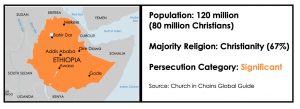
The Federal Democratic Republic of Ethiopia is Africa’s oldest independent nation and one of its poorest. The economy depends on agriculture (coffee is the main export) but the frequency of droughts is increasing and many Ethiopians depend on food aid from abroad.
Ethiopia was never colonised apart from Mussolini’s occupation 1939-41. British troops helped to oust the Italians in 1941 and put Emperor Haile Selassie back on his throne but in 1974 a Marxist junta led by Mengistu Haile Mariam overthrew him and thousands were killed. Drought, famine and war brought millions to the brink of starvation in the 1970s and 1980s and contributed to the collapse of Mengistu’s regime in 1991, after which conditions stabilised.
Eritrea gained independence from Ethiopia in 1993 and tens of thousands were killed in the war that followed (1998-2000). A fragile truce held until a peace agreement was signed in July 2018, part of a wide programme of reforms launched by Prime Minister Abiy Ahmed, who was elected to office in April 2018. He also lifted a state of emergency and released thousands of political prisoners.
Prime Minister Abiy Ahmed, who is a Christian from a mixed Christian-Muslim family, won the Nobel Peace Prize in 2019 for his peace agreement with Eritrea, but in November 2020 he joined forces with Eritrea’s President Isaias Afewerki to fight against Ethiopia’s rebel province of Tigray. The conflict between the Ethiopian army (supported by Eritrean forces) and Tigrayan troops resulted in over 250,000 deaths from conflict and starvation and over three million displaced, with both sides committing atrocities. A ceasefire was agreed in November 2022.
Christians in Ethiopia
Ethiopia is the second-oldest officially Christian nation in the world after Armenia and the majority of Ethiopians are Christians. Its religious makeup is 44% Ethiopian Orthodox, 31% Muslim and 23% evangelical/Pentecostal, with Orthodoxy dominant in the north and Islam in the south. In both regions fanatical members of the majority religion have been hostile to evangelicals due to significant numbers leaving Orthodoxy and Islam to embrace evangelical Christianity. This hostility sometimes leads to outbreaks of violence, with some evangelicals killed and churches burnt down. The Ethiopian Orthodox Church was the state church from 1270 until 1974 and considers itself the only true church and a symbol of national identity.
The Marxist regime persecuted all perceived opponents, including Christians and especially evangelicals, who in 1974 numbered only 5%. Many were martyred and churches were destroyed, yet many people became Christians during that period.
The overthrow of the junta in 1991 led to stability and relative freedom for Christians. The constitution protects freedom of religion but the government restricts this freedom, fearing that religious groups could bring about a regime change, and demands that churches other than Ethiopian Orthodox register.
In Muslim-majority areas there are sporadic violent mob attacks on churches and arrests and disappearances of Christian converts are common. Christians in these areas are often harassed and intimidated and pastors and evangelists face violent attack. In addition, Islamic State extremists have been trying to gain a foothold in eastern Ethiopia.
Sources: BBC, Church in Chains Global Guide, Open Doors, Operation World, World Watch List
Church in Chains in Action
In February 2019, Church in Chains sent €3,500 in response to an appeal from partner organisation Steadfast Global to restore church buildings in the town of Halaba Kulito which were badly damaged in recent arson attacks.
